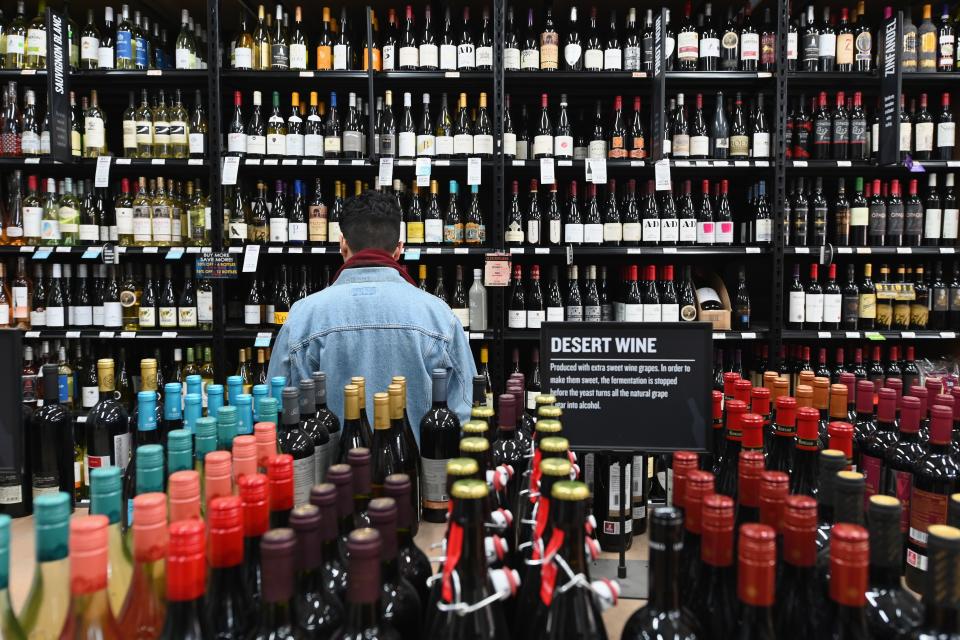Wine store sales surge amid US coronavirus outbreak
Many U.S. cities have versions of shelter-in-place enacted to slow the spread of the coronavirus, leaving thousands of businesses closed. But wine and liquor stores – deemed “essential” in many of the hardest hit areas, including New York – are open and seeing a large uptick in sales.
“Business is very busy,” said Greg Rubin, owner of Vanderbilt Wine Merchants in Brooklyn, N.Y. (New York City has become an epicenter of coronavirus cases.) “We closed the door to walk-in traffic over a week ago, but between many customers stocking up more than usual and the fact that restaurants are closed, we’re still experiencing a big increase,” he said.
It’s not just stocking up: Rubin pointed to the fact that with restaurants closed for dining in, people have been simply giving themselves the hospitality treatment.
Vivino, a social media app that also acts as an online sales platform for wine sellers, told Yahoo Finance that last Friday (March 13) eclipsed every day except for Black Friday 2019 in terms of sales. Gross merchandise volume, the app said, was up 300% compared to that day the previous year. The app says it has 42 million users.
In New Rochelle, N.Y., which became an early hotspot for the virus on the East Coast, the trend seemed similar. An employee who answered the phone at Grape Exchange, a local wine store, said he couldn’t talk about whether business has been busier during the pandemic, because it was “too busy right now.”

Not every wine store is seeing benefits during this time, however..
Lorena Ascencios, a wine buyer at Astor Wines and Spirits in New York, said that during the crisis its online business “has increased significantly,” but not enough to make up for the business that would be done in-store. Astor, for now, is restricted to deliveries, not pickups. Still, Astor Wines COO Rob Fisher told NY1 that the store has never been busier.
The wine industry has been slow to adapt to e-commerce, due to its complex model with many independent shops and producers that are loosely connected. This has provided a push for some shops to fine-tune the online part of their business.
It hasn’t been necessarily easy. Many brick-and-mortar businesses have had to dramatically revamp their websites and ordering systems to reflect current inventory — something that is often not necessary, or even a large part of their business.
“We’ve improved our online and phone ordering system (we take text message orders now), and are launching an improved website experience this week to help make online ordering easier for people,” said Rubin.
The delivery/pickup model has been a bit of an improvisation, but measures have fallen into place for delivery workers — leaving purchases in mailboxes only, only accepting tips via Venmo, and staying away from customers. For pickups, gloves at all times, every surface constantly wiped down, are standard now.
Rubin said his business benefited from being among the first in New York City to close to in-store buying, something that was made possible by having another store in the suburbs of Connecticut.
“The suburbs — both residents and the local government — were like a canary in the coal mine for Vanderbilt, reacting more severely and easier than New York City,” he said. “So we were able to see how things would progress in the city.”
--
Ethan Wolff-Mann is a writer at Yahoo Finance focusing on consumer issues, personal finance, retail, airlines, and more. Follow him on Twitter @ewolffmann.
Here’s how long it usually takes to recover from a bear market
Companies face fresh security risks due to people working from home
Read the latest financial and business news from Yahoo Finance
Follow Yahoo Finance on Twitter, Facebook, Instagram, Flipboard, LinkedIn, YouTube, and reddit.

 Yahoo Finance
Yahoo Finance 